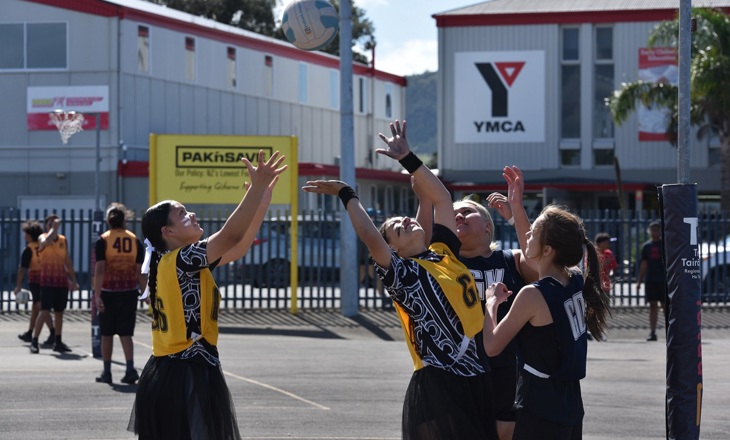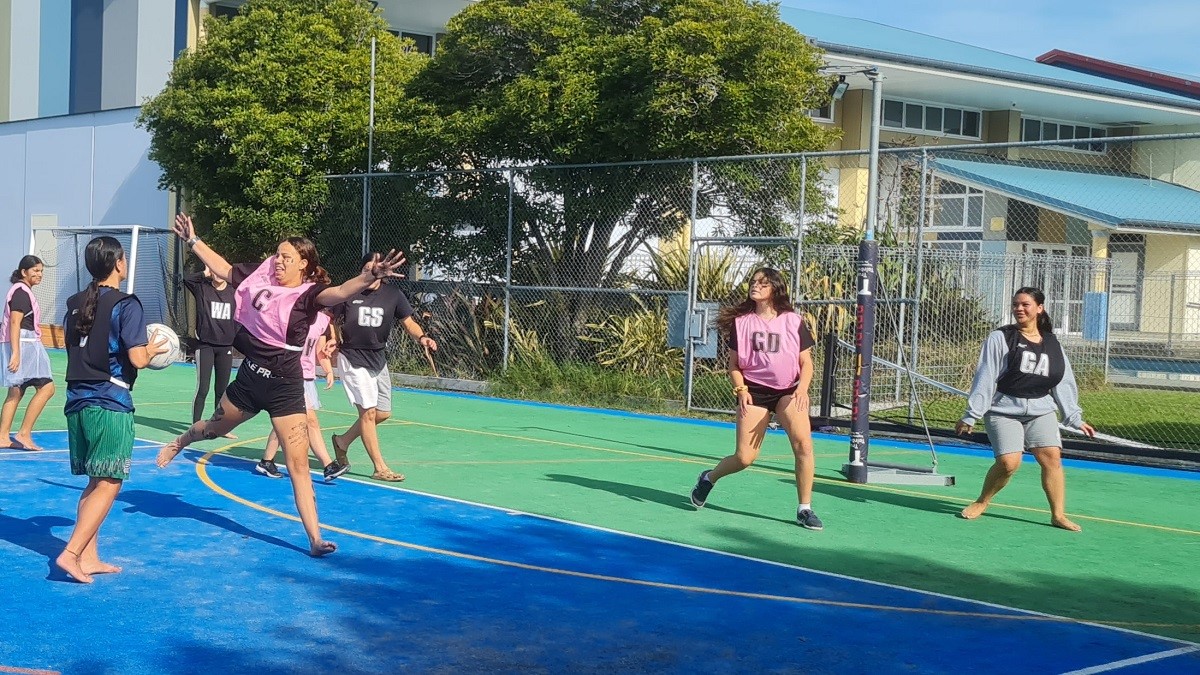Netball hits fast forward with youth-driven events
Netball hits fast forward with youth-driven events
Case study: Impacts of Young Women’s Activation Fund

Netball centres and Netball NZ are creating opportunities for rangatahi to be heard and lead their own netball experiences.
On the North Island’s remote East Coast, netball has been struggling – with a lack of coaches, umpires, managers, and leadership, resulting in a decline of young people participating in the sport.
Seeking to reignite young people’s interest in netball, local administrators engaged a rangatahi leaders group to co-design an event programme that would appeal to students from the region’s four far-flung colleges.
When planning Netfest, an inter-school event, the youth leaders flipped the concept on its head and suggested students from different schools play with rather than against each other.
The teams, they suggested, should consist of girls and boys from each school playing alongside each other – rather than the traditional school-versus-school model – saying the move would discourage over-competitiveness and see everyone focused more on fun and whanaungatanga.
They would be proved right at Netfest East Coast 2021, which was highly successful despite the challenges of COVID-19, a lack of facilities, and geography that can make planning in-person events for students in the region difficult.
They started by introducing ‘have a go’ sessions at each school. Following these, the Netfest concept – which would see combined teams compete in two new netball formats (Fast 5 and Grass) – was born.
Supported by Sport Gisborne Tairāwhiti, Tū Manawa, Te Runanga o Ngāti Porou and the Gisborne Netball Centre, the event was held in Ruatoria at Ngata Memorial College, drawing 51 participants from across the regions’ schools. Of these, more than half were either new to or reengaging with the sport.
“We were stoked with the event,” says Gisborne Netball Centre youth development officer Monique McLeod.
“It was pretty special. The rangatahi loved the chance to play alongside kids from other schools. It was a cool experience for them.”
The portable goals and balls provided as part of the programme for play on grass meant more games could be held at once, reducing wait times between matches.
Seventy-five percent of the group reported enjoying both the grass and Fast5 Netball formats, while twenty-five percent preferred Grass Netball.
Significantly, every student surveyed enjoyed the mixed teams concept that had been suggested by the rangatahi leaders group. The chance to play alongside peers from other schools was rated by participants as one of the most enjoyable elements of the event.
More than half of the boys and girls surveyed reported increases in their confidence and skill levels following the event.
The success of Netfest East Coast is just one example of a wider effort from the sport to co-design its future with young people.
“It was pretty special. The rangatahi loved the chance to play alongside kids from other schools. It was a cool experience for them.”
Netball NZ’s data showed that netball was less accessible to students from lower decile schools, and there were limited opportunities for young people to have their say on how the sport was delivered. With support from Sport New Zealand’s Young Women’s Activation Fund, Netball NZ set out to tackle those issues nationwide.
It tasked 12 netball centres across the country to either create or bolster Youth Advisory Groups (YAGs) to co-design festivals and tournaments showcasing the Fast 5 – a new fast-paced, five-a-side version of the game.
Netball NZ allowed flexibility for local centres to meet the distinct needs of their communities. While Fast 5 was the suggested format for Year 1, there was no requirement for that to still be the case by Year 3, for example.
Netball NZ was successful in boosting the number of young people participating in the game’s delivery, with the national membership of its YAGs increasing from 25 in 2020 to 92 the following year, collectively generating 1281 participants.
Regular meetings of a national Fast 5 Centre Group have been invaluable for the sport, providing a platform to share knowledge and support development across the country.
Netball has bolstered its youth leadership, successfully introduced new co-designed formats of the game to broaden its appeal, introduced the sport to new players and re-engaged with others who had drifted away from the game.
At a Glance
What was the identified need or problem in the community?
Like all sports, Netball faces the challenge of remaining relevant to a future generations. Netball NZ recognised that few opportunities existed for young people to have a say in the delivery of the game. Data also showed that students from lower decile schools were less likely to play college netball, suggesting there were barriers to participation.
What challenges or barriers existed and how were they overcome?
Around 150-200 kilometres north of Gisborne, the rural East Coast communities of Ruatoria, Te Araroa and Hicks Bay have four low decile high schools/wharekura between them. With the drive between the schools ranging from 30 to 45 minutes, distance was a challenge to overcome. So, too, was the run-down state of facilities in the region.
Netball’s existing administrative structure did not provide a mechanism for young people to impact how the sport was delivered in their local communities. Barriers such as a lack of time due to school and other commitments as well as a lack of motivation and energy impacted the likelihood of young people playing the sport.
Netball NZ tasked 12 netball centres nationwide to form Youth Advisory Committees and work with young people to deliver Fast 5 events.
While strong progress has been made, more work is required to maintain the sport’s now magnified youth voice. Netball NZ has found that many members of YAGs move onto other regions for reasons such as study, work and relationships, which can make continuity a challenge. So Netball NZ has highlighted the need for a succession plan and a mechanism for centres to connect their YAG members to new centres should they relocate.
What were the key success factors – and were they driven by an innovative approach?
Netball Centres and Netball NZ engaged with rangatahi throughout the design and delivery processes, creating opportunities for rangatahi to be heard and lead their netball experiences. One example of this was at was the East Coast’s Netfest, where rangatahi preferred to play alongside, rather than against, their peers from other schools and grass netball was the most popular format.
The number of young people contributing to the sport’s delivery and impacting its future direction increased both numerically and geographically. Crucially, local solutions were proposed to local issues, with feedback then fed through to a national youth committee.
What outcomes were achieved?
Fast 5 events increased participation numbers in secondary schools, with many players either trying the sport for the first time or returning to it having previously given up the game. Confidence levels increased both in those helping to deliver Fast 5 events through YAGs, and those participating in them.
While COVID-19 impacted the YAGs’ programmes (particularly in Auckland which did not deliver any initiatives), they collectively generated 1281 participants. Of those, 309 were new to Netball, while 135 returned to the sport having previously given up playing.
The impact of the YAGs on their members has been significant. When surveyed initially, 74% were either “not confident, a little confident or somewhat confident” going into their experience, while just 26 were confident to participate in the YAGs. When surveyed again after their participation, the confidence level of the participants had increased to 68 percent.
What comes next?
Netball has significantly boosted its ability to include a youth perspective in decisions that will impact its future. The sport intends to maintain and bolster its network of Youth Advisory Committees, helping it adapt to and deliver for the needs of future generations of players.
Gisborne Netball Centre’s Monique McLeod is now working with the schools to deliver Netfest 2023 after the 2022 event was cancelled due to the severe weather events that impacted the region. Netfest 2023 is scheduled for August.
McLeod hopes the event will be expanded to included senior students – with the first Netfest limited to Year 9 and 10 students due to the lingering impacts of Covid-19.
